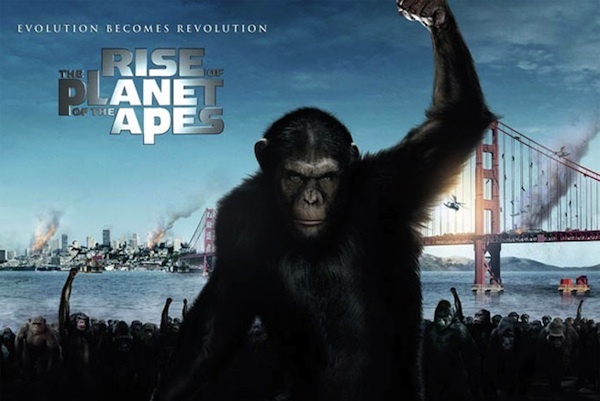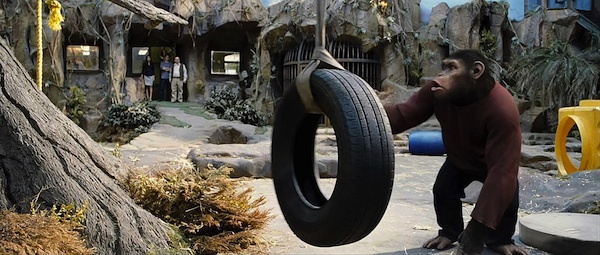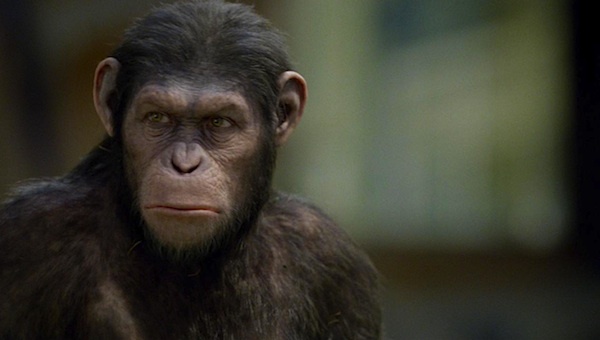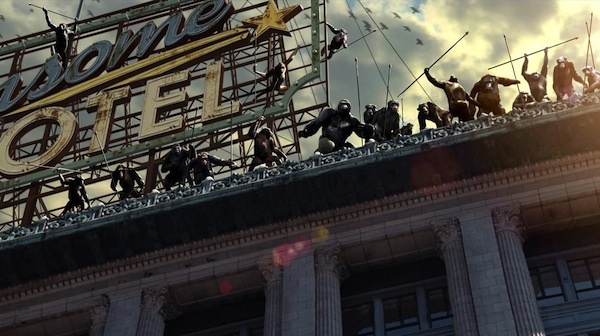Has Lord Bobo (and his primate minions) finally taken over the planet? This prequel to the classic franchise seems to suggest so. But is it any good, or have the filmmakers gone bananas?…
Great things can happen when you least expect it.
The summer blockbuster season of 2011 is drawing to an end. Most of the offerings this year have been frustratingly lacklustre. All that’s left is the month of August, traditionally a dumping ground for projects that studios have little faith in, or want to move out of the way to avoid being crushed by pirates, superheroes, boy wizards and shape-shifting robots at the box office. “Rise Of The Planet Of The Apes” is a prequel nobody asked for, based on a franchise hardly anybody of this generation is familiar with. Yet it is without a doubt the best film of the summer. I sure didn’t see this coming.
Being a film geek, I have a long-standing affection for the old “Apes” movies, even though they were made way before my time. 1968’s “Planet Of The Apes”, based on the novel by Pierre Boulle is a true genre classic. That infamous shock ending is now an iconic, endlessly referenced part of pop culture. Its four sequels never hit the same heights, though a couple of them shared the original’s deliciously nihilistic view of humanity. What really drove the final nail into the franchise’s coffin was a horribly misguided remake by Tim Burton in 2001. It’s taken a whole decade for the bad aftertaste to subside. Still, Twentieth Century Fox felt they hadn’t milked this cash cow completely dry. Burton’s travesty actually managed to turn a tidy profit. So here we are today with a new “Apes” movie. Sometimes, corporate greed yields unexpected benefits.
I’d like to believe this new film wasn’t motivated solely by financial gain. The smartest thing Fox ever did was to hire Rupert Wyatt to direct, along with Rick Jaffa & Amanda Silver to write the script. Englishman Wyatt had only one other feature-length film under his belt, low-budget indie “The Escapist”. At face value, he wouldn’t seem right for the job of marshalling a big-budget visual effects showcase. But all the strengths of “Rise” were already present and correct in his debut work: strong characterisation, solid writing, and a sense of restraint that comes not just from budgetary limitations but an understanding that sometimes, in order to get a point across, less is more. Michael Bay, please take note. When given US$93 million to play with, Wyatt still displays admirable restraint. He knows that at the end of the day, if you don’t care about your characters, all the flash and bang in the world won’t save your movie.
Which isn’t to say “Rise” doesn’t have the visual dazzle required for a summer sci-fi flick. This is CGI at its very best, wowing with you with a how-the-hell-did-they-do-that flair, while never losing sight of the most important rule. Visual effects, like any other filmmaking tool, are meant to help filmmakers tell a story. For a guy who’s never worked with effects on such a scale, Wyatt sure knows how to make it work. The fully-digital apes, with chimpanzee protagonist Caesar at the forefront, have been stunningly brought to life by WETA Studios. There is a genuine spark in Caesar’s eyes — the light of the soul, if you will. It’s an amazing achievement, and shows how far we’ve come technologically since Gollum, which was already a major milestone back then. The ape animation isn’t perfect, mind you. A couple of shots here and there look slightly unfinished. But that’s almost irrelevant. Because once we get into the story, we believe 100% in these characters. And we care. I don’t think I’ve seen a movie this year that moved me as much as this. The emotions here are very well-judged. They never veer into overwrought, manipulative sentimentality. Instead, every moment of pity, compassion or heartbreak is honestly earned. Wyatt has a knack for finding these feelings in small character beats, like a simple look or gesture.
The lion’s share of credit must go to Andy Serkis. He plays Caesar through the magic of real-time performance-capture technology, where sensors on his face and body are read by the computer and translated into his primate avatar onscreen. Which means every expression, every twitch, every subtle shift in posture that Serkis does becomes Caesar’s. It goes way beyond pantomime, as Serkis invests his chimp character with an incredible depth and breadth of personality. It’s not an obvious, black & white characterisation either. There are times where you sympathise with Caesar, and others where you fear him, or even doubt his real motives. Sometimes all within a single scene. The film industry is currently rife with talk of giving Serkis his long-overdue Oscar nomination. Caesar might be the one to finally persuade the Academy, who’ve foolishly refused to acknowledge performance-capture as “real” acting.
Surprisingly, other ape characters are pretty well fleshed out too. Caesar grew up in comfort among humans and has no idea how apes in captivity really live, until he is thrown into an animal facility. There he discovers a world of cruelty and oppression, which plant in him the seeds of discontent, then rebellion. He also finds true kinship for the first time in his fellow inmates. There is Maurice the wise old circus orangutan, who communicates with Caesar via sign language. Amusingly, their conversations come with subtitles. Then there is the nasty alpha male chimp from whom Caesar learns the value of power and dominance. And finally Buck, a huge gorilla condemned to solitary confinement who becomes his most loyal follower after Caesar cleverly orchestrates his release. What’s so cool about these scenes is that they are completely dialogue-free. Yet the audience knows exactly what’s going on in the minds of the apes, just by their looks and actions. This is visual storytelling at its purest.
Caesar and the rest of the apes are so good to watch that the human cast pales in comparison. James Franco’s scientist Will Rodman is a little colourless, though that’s more due to his role being written primarily as a means to get the plot moving. To his credit, Franco shows urgency and conviction when it’s called for, and there is a sense of natural progression in his relationship with Caesar. The other actors are given far less to do, with the script relegating them to functional stereotypes like sympathetic good guys (Freida Pinto as Will’s girlfriend) or just-asking-for-it bad guys (Brian Cox, Tom Felton and David Oyelowo). None of them are terrible, and they serve their functions well enough to get the audience siding with the apes. John Lithgow fares the best as a once-brilliant man struck down by Alzheimer’s disease. I found his scenes with his son Will, and with Caesar, the most touching. It’s the emotional centre of the whole story.
In “Rise”, the apes gain super intelligence due to Will’s research into a cure for Alzheimer’s. Like all cautionary tales about man’s tinkering with nature, the best of intentions lead to disastrous results. The filmmakers clearly disapprove of animal testing in medical research. And who can argue with that stance? In the real world, that sort of horror goes on every single day. Although no one likes being preached to, it is refreshing to see a film that has something to say. All good science-fiction stories say something about the human condition, or serve as a mirror to reflect human nature. The 1968 film reflected Cold War paranoia and warned of mankind’s self-destructive tendencies. In 2011, our great fears are natural disasters and viral pandemics, two themes the film tackles in varying levels of metaphor. The ape uprising at the film’s climax could be read as the wrath of Mother Nature for our sins.
Taken solely on surface appeal however, “Rise” is still a fast-paced, engaging experience that rewards both newcomers as well as longtime fans. It never forgets that first and foremost, its duty is to entertain. It does have a few flaws. In an effort to keep the proceedings brisk, the film’s narrative occasionally resorts to shortcuts, some of which don’t really make sense when you stop to think about it. It also suffers from common prequelitis: the need to match up stuff with what we know of previous films. In this case, it involves an ability that wouldn’t be possible for Caesar, given his regular ape anatomy. I can overlook this because when it happens, the effect is quite shocking. Plus it serves the character and the story’s purpose, as the pivotal turning point in ape evolution. Where on paper it comes across as goofy, on screen it’s quite a powerful moment. To say any more would ruin the surprise.
That’s what “Rise Of The Planet Of The Apes” is all about. Pleasant surprises. Future viewings may not reveal this film to be a classic on par with the original, but that’s an impossible expectation anyway. What it is though, is a terrific restart to the franchise. Wyatt and team have given us something new without forsaking the old. A risky balancing act but they pulled it off with aplomb and a lot of heart.
Expect everybody to ask for more “Apes” now.
For more movie reviews check this out.






correction: i meant utter disrespect not respect…..sorry.
please ban this movie from malaysia. hollywood has shown utter respect by not offering roles to natural BN apes from malaysia.